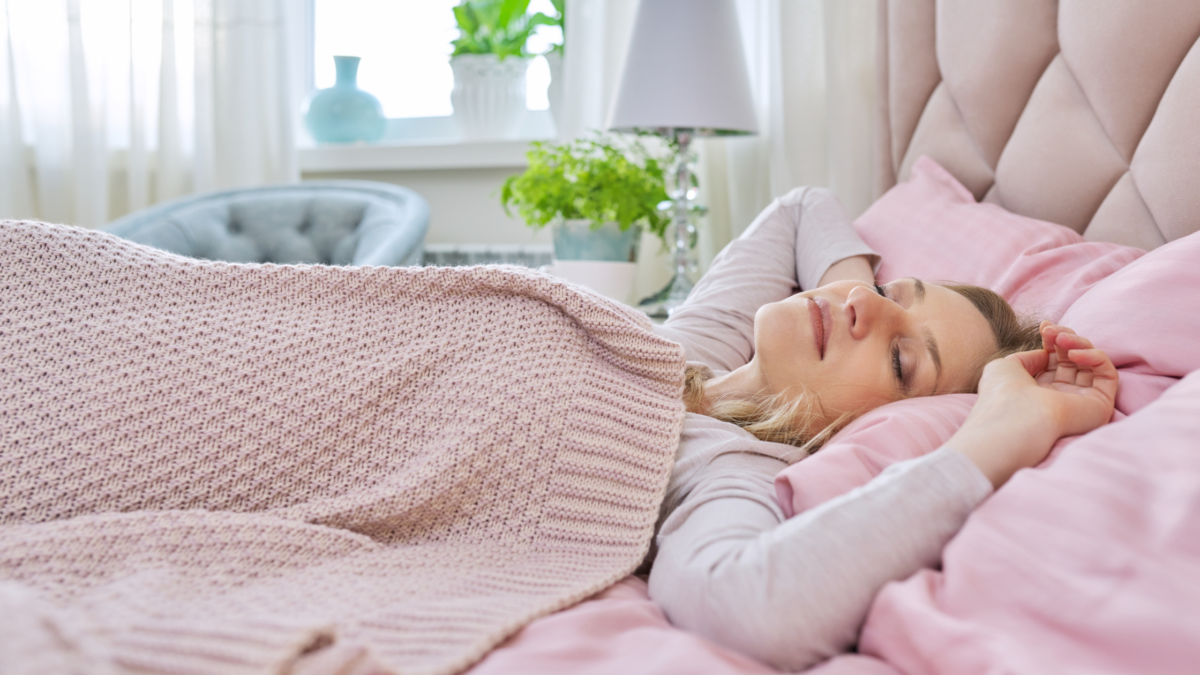


Medically Reviewed By Margaret Etudo. Written By The Vitamins For Woman Team.
Are you struggling with restless nights during menopause? Discover how magnesium for menopause sleep can help you relax, fall asleep faster, and sleep more naturally.

Sleep issues are one of the most common complaints during perimenopause and menopause. Studies estimate that up to 60% of women experience some form of insomnia during this transition.
Whether it’s difficulty falling asleep, staying asleep, or waking too early, poor sleep can quickly affect mental clarity, mood, metabolism, and overall health.
Hormonal changes — especially the drop in estrogen and progesterone — play a significant role. However, chronic stress, magnesium deficiency, and age-related changes in melatonin production all contribute.
That’s where magnesium may help. Magnesium supports relaxation, calms the nervous system, and helps regulate sleep-related hormones. It can be a safe and effective tool in your menopause sleep toolbox.
Many women are turning to natural remedies for menopause sleep issues, and magnesium continues to stand out. This article will teach us how it works, its best form, and the safest dosage.
Magnesium is a mineral your body needs for hundreds of essential jobs, especially for your nerves and muscles to work correctly. When it comes to sleep, magnesium helps in several key ways:
Magnesium can also ease things like muscle cramps, restless legs, and headaches, all of which can keep you awake at night.
During menopause, levels of estrogen and progesterone decline, impacting sleep in several ways:
Magnesium helps regulate melatonin and cortisol, making it particularly relevant for menopause-related sleep issues.
Not all magnesium supplements are the same. Some are better absorbed or more calming than others. Here’s a breakdown of two of the most effective forms of sleep support:
Magnesium glycinate is magnesium bound to glycine, an amino acid known for its calming effects. It’s:
Why it’s ideal for menopause sleep: Glycine helps promote deeper, restorative sleep. Combined with magnesium’s relaxing effects, this form is often the best type of magnesium for sleep, especially when hormonal changes and anxiety are at play.
Magnesium citrate is magnesium bound to citric acid. It’s also well absorbed and has a mild laxative effect, making it suitable for women who struggle with constipation, a common menopause symptom.
While not as calming as glycinate, magnesium citrate can still support sleep through its effects on muscle relaxation and stress reduction.
It is advisable to avoid magnesium oxide, as it has low bioavailability and is primarily used as a laxative.
The recommended daily allowance (RDA) for magnesium in adult women is around 310–320 mg, but this can vary with age and individual needs. During menopause, due to increased stress and possible dietary gaps, many women benefit from slightly higher doses in the range of 300–400 mg per day.
Magnesium glycinate tends to be well-tolerated even at higher doses.
Always read product labels, as the elemental magnesium content (the actual magnesium your body absorbs) varies by formulation.
For best results:
Avoid taking magnesium with high-calcium foods or supplements, as calcium may interfere with absorption.
If you’re looking for the best magnesium supplements for menopause sleep, here are five pharmacist-approved options:
These options are available through most online supplement stores, pharmacies, and practitioner platforms. Always choose third-party tested brands and avoid proprietary blends with unclear labeling.
Some women notice improved sleep within a few days; for others, it may take 2 to 4 weeks of consistent use. It depends on your baseline magnesium status, stress levels, and the presence of other sleep disruptors (like caffeine, screen time, or hormonal imbalances).
Magnesium doesn’t directly reduce hot flashes or night sweats, but it may improve how your body handles stress and temperature fluctuations. Better sleep can also reduce how disruptive night sweats feel.
Yes — magnesium is generally safe when used at appropriate doses. Most side effects (like diarrhea) result from excessive intake or poorly absorbed forms. If you have kidney problems, talking to your doctor before taking magnesium is essential. Long-term magnesium is safe and often needed for most people, primarily if your diet doesn’t provide enough. This deficiency can happen more easily than you’d think, thanks to stress, aging, or nutrient-depleted soil in our food supply.
Sleep during menopause doesn’t have to be a nightly struggle.
Magnesium for menopause sleep is one of the most well-researched, natural tools to improve rest, support hormonal balance, and ease this transition’s physical and emotional stress.
You can take meaningful steps toward better sleep by choosing the correct form (such as magnesium glycinate), staying consistent, and addressing other factors like stress and self-care.
You don’t need to suffer through restless nights. Safe, natural options exist — magnesium may be the key to restoring your sleep and sense of calm.
Baker FC, Willoughby AR, Sassoon SA, Colrain IM, de Zambotti M. Insomnia in women approaching menopause: Beyond perception. Psychoneuroendocrinology. 2015;60:96-104.
Haufe A, Leeners B. Sleep disturbances across a woman’s lifespan: what is the role of reproductive hormones? Journal of the Endocrine Society. 2023;7(5):bvad036.
Capanna-Hodge DR. Best magnesium for the anxious brain. Dr. Roseann.
Malesu VK. Melatonin vs. Magnesium: which works best for sleep? News-Medical.
Alateeq K, Walsh EI, Ambikairajah A, Cherbuin N. Association between dietary magnesium intake, inflammation, and neurodegeneration. Eur J Nutr. 2024;63(5):1807-1818.
Söderpalm AHV, Lindsey S, Purdy RH, Hauger R, Wit de H. Administration of progesterone produces mild sedative-like effects in men and women. Psychoneuroendocrinology. 2004;29(3):339-354.
Kawai N, Sakai N, Okuro M, et al. The sleep-promoting and hypothermic effects of glycine are mediated by nmda receptors in the suprachiasmatic nucleus. Neuropsychopharmacology. 2015;40(6):1405.
Mori H, Tack J, Suzuki H. Magnesium oxide in constipation. Nutrients. 2021;13(2):421.
Stanford Advanced Mateial: Magnesium oxide: from industry to health. SAMaterials
Getting your zzz’s: the best magnesium for sleep | one oak medical. One Oak Medical Group PLLC.

medically reviewed by margaret etudo, BPharm. written by the vitamins for woman team.